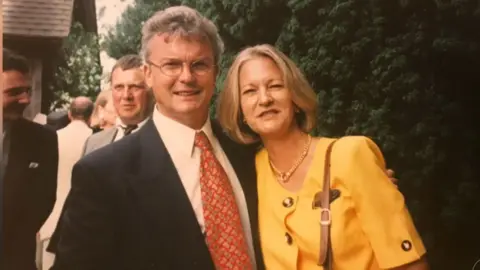David Challen, a prominent domestic abuse advocate, recently shared his deeply personal experiences about growing up in a home where psychological abuse was a normalized reality. In his newly released book, titled “The Unthinkable,” he recounts his upbringing in Claygate, a prosperous suburban village in Surrey. David’s mother, Sally Challen, became a household name after she was imprisoned in 2011 for killing her husband, Richard, using a hammer. This act was the culmination of decades of enduring coercive control, which David describes as deeply ingrained in their family dynamics.
In David’s portrayal of his family life, he reflects on the striking contrast between the outward appearance of a pristine middle-class household and the grim truths hidden behind closed doors. His campaign to secure his mother’s release from prison in 2019 was driven not only by familial loyalty but a growing awareness of the severity of the abuse she had suffered, which he believed warranted a reevaluation of her conviction.
When presenting his narrative, David acknowledges the complexity of his emotions. He stated in an interview, “She’d done the worst act anyone possibly could do. She took away my father.” This admission captures the internal conflict he feels, a blend of love for his mother and grief for his father. Reflecting on the impact of his father’s abusive behavior, David mentions feeling a sense of something “inherently bad” about his father, although he lacked the language to articulate it as a child. He candidly confesses that he had “normalised the coercion and control” within their home, suggesting that the familial atmosphere was steeped in a troubling dynamic that shaped his understanding of relationships and power.
The significant legislative shift in 2015, which recognized psychological manipulation as a form of domestic abuse, was critical in securing Sally’s release from prison. This new framework defined coercive control, acknowledging that psychological abuse can be as damaging as physical violence. David characterizes this recognition as liberating for both himself and his mother, enabling them to finally articulate their experience and acknowledge the insidious nature of the abuse they had sustained.
Through “The Unthinkable,” David seeks to give voice to the often-unspoken realities of living under domestic abuse, advocating for better protection for victims. He reflects on how societal narratives surrounding domestic violence often overlook the psychological dimensions that can pervade a household. He emphasizes the need to continue addressing these issues, arguing, “A decade on, we’re not tackling it enough. I continue to speak out because I don’t want these events to happen again.”
His personal history of grappling with “intergenerational trauma” compels him to assist others facing similar circumstances. By sharing his family’s story, David aims to raise awareness about the complexities of domestic violence, especially when it involves psychological manipulation that may not be visible to the outside world.
His recollections of a childhood marked by fear illuminate the long-lasting impact of such trauma, forcing him to confront elements of his past that he had buried along with his father. David’s story is not merely a narrative of tragedy; it is also one of resilience and determination to advocate for change—change that, according to him, is crucial for the future of domestic abuse discourse.
In conclusion, David Challen’s experiences portray a chilling glimpse into the normalization of abuse within seemingly perfect domestic spheres. His book “The Unthinkable” not only tells the story of his family’s trauma but serves as a rallying cry for greater societal awareness and solutions to the pervasive issue of domestic abuse in its many forms. Analyzing both personal and broader societal contexts underscores the pressing need to address and understand the complexities of abuse, ensuring that victims are recognized and supported.



